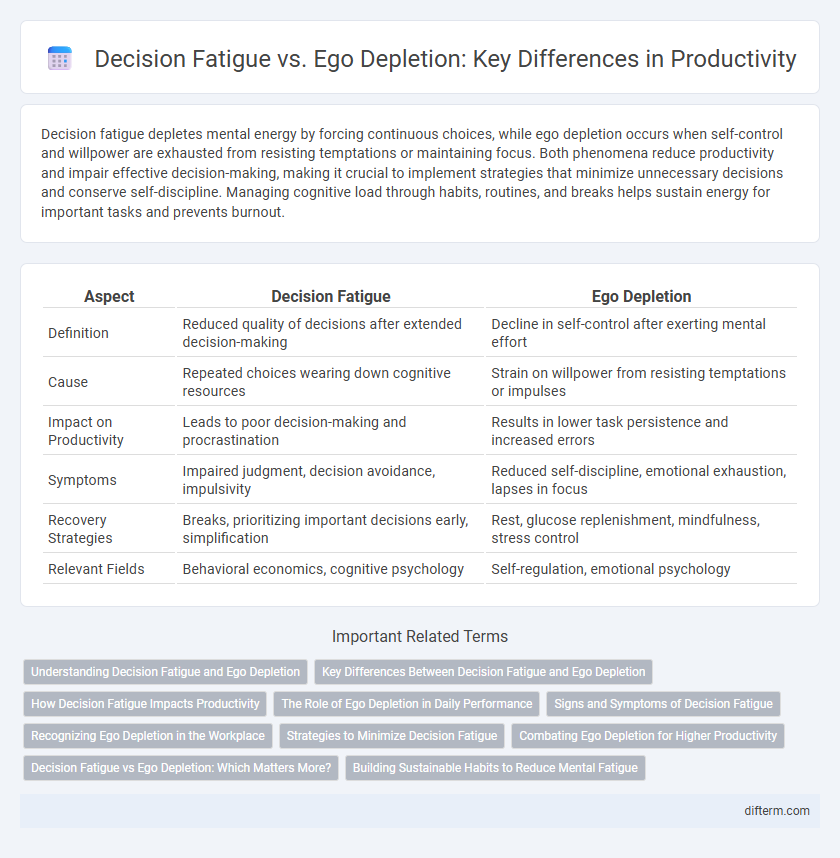Decision fatigue depletes mental energy by forcing continuous choices, while ego depletion occurs when self-control and willpower are exhausted from resisting temptations or maintaining focus. Both phenomena reduce productivity and impair effective decision-making, making it crucial to implement strategies that minimize unnecessary decisions and conserve self-discipline. Managing cognitive load through habits, routines, and breaks helps sustain energy for important tasks and prevents burnout.
Table of Comparison
| Aspect | Decision Fatigue | Ego Depletion |
|---|---|---|
| Definition | Reduced quality of decisions after extended decision-making | Decline in self-control after exerting mental effort |
| Cause | Repeated choices wearing down cognitive resources | Strain on willpower from resisting temptations or impulses |
| Impact on Productivity | Leads to poor decision-making and procrastination | Results in lower task persistence and increased errors |
| Symptoms | Impaired judgment, decision avoidance, impulsivity | Reduced self-discipline, emotional exhaustion, lapses in focus |
| Recovery Strategies | Breaks, prioritizing important decisions early, simplification | Rest, glucose replenishment, mindfulness, stress control |
| Relevant Fields | Behavioral economics, cognitive psychology | Self-regulation, emotional psychology |
Understanding Decision Fatigue and Ego Depletion
Decision fatigue refers to the deteriorating quality of decisions made by an individual after a long session of decision-making, leading to reduced cognitive resources. Ego depletion describes the state where self-control or willpower is drained from repeated acts of self-regulation, impairing subsequent decision-making abilities. Both phenomena highlight the critical impact of mental energy on productivity and emphasize the need for strategic decision management.
Key Differences Between Decision Fatigue and Ego Depletion
Decision fatigue refers to the deteriorating quality of decisions after a long session of decision-making, primarily impacting cognitive resources needed for sound judgment. Ego depletion, on the other hand, involves the overall reduction in self-control and willpower following strenuous mental exertion, affecting tasks beyond decision-making. Key differences include the scope of impact--decision fatigue is specific to decision quality, while ego depletion broadly diminishes self-regulation capacities.
How Decision Fatigue Impacts Productivity
Decision fatigue significantly reduces productivity by impairing individuals' ability to make effective choices as mental energy depletes throughout the day. When decision fatigue sets in, cognitive resources are exhausted, leading to poorer judgment, impulsivity, and avoidance of tasks requiring complex thinking. Managing the number of daily decisions and implementing routine habits can mitigate productivity losses caused by decision fatigue.
The Role of Ego Depletion in Daily Performance
Ego depletion significantly impacts daily productivity by reducing an individual's self-control and decision-making capacity after exerting mental effort. This decline in cognitive resources leads to impaired performance in tasks requiring sustained attention and complex decision-making. Understanding the role of ego depletion helps optimize task scheduling to maintain high levels of efficiency throughout the day.
Signs and Symptoms of Decision Fatigue
Decision fatigue manifests as impaired decision-making ability, increased impulsivity, and procrastination, often accompanied by feelings of mental exhaustion and reduced willpower. Individuals may experience difficulty concentrating, indecisiveness, and a tendency to choose default or easiest options without thorough evaluation. Recognizing these signs is crucial for managing productivity and implementing strategies to conserve cognitive resources throughout the day.
Recognizing Ego Depletion in the Workplace
Ego depletion manifests in the workplace as reduced self-control, decision-making ability, and willpower, leading to decreased productivity and increased errors. Recognizing signs such as irritability, impulsive choices, and procrastination helps managers implement strategies like scheduled breaks and task rotation to mitigate its effects. Understanding the distinction between decision fatigue and ego depletion enables targeted interventions to sustain employee performance throughout the workday.
Strategies to Minimize Decision Fatigue
Implementing routine decision-making frameworks and prioritizing important choices during peak mental energy hours significantly reduces decision fatigue. Utilizing automation tools for repetitive tasks conserves cognitive resources, helping maintain focus on critical activities. Establishing clear priorities and limiting options streamlines decision processes, preventing ego depletion and enhancing overall productivity.
Combating Ego Depletion for Higher Productivity
Ego depletion significantly reduces self-control and decision-making capacity, hindering productivity by draining mental energy needed for focused tasks. Implementing strategies such as regular breaks, prioritizing high-impact decisions early, and maintaining balanced nutrition can replenish cognitive resources and sustain performance throughout the workday. Leveraging techniques like mindfulness and task batching helps mitigate ego depletion, leading to enhanced efficiency and goal achievement.
Decision Fatigue vs Ego Depletion: Which Matters More?
Decision fatigue and ego depletion both impair cognitive function, but decision fatigue specifically results from the mental exhaustion caused by making numerous choices, reducing the quality of subsequent decisions. Ego depletion refers to the overall depletion of self-control resources, affecting willpower across various tasks beyond decision-making. Research suggests decision fatigue has a more immediate impact on productivity by diminishing critical thinking and problem-solving abilities during decision-heavy activities.
Building Sustainable Habits to Reduce Mental Fatigue
Building sustainable habits reduces mental fatigue by minimizing decision fatigue and conserving self-control resources linked to ego depletion. Establishing routines automates choices, lowering cognitive load and preserving willpower throughout the day. Consistent habits enhance productivity by maintaining mental energy and preventing burnout.
decision fatigue vs ego depletion Infographic

 difterm.com
difterm.com